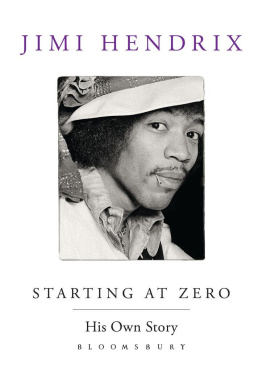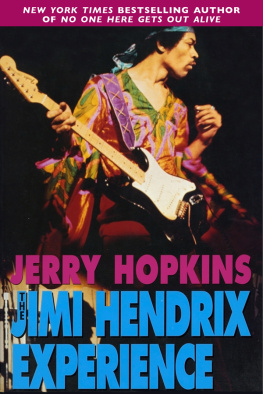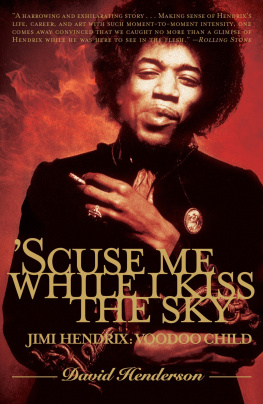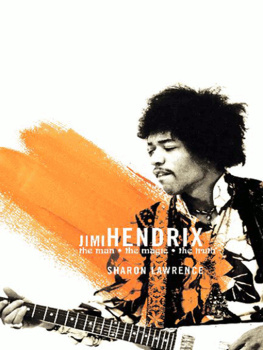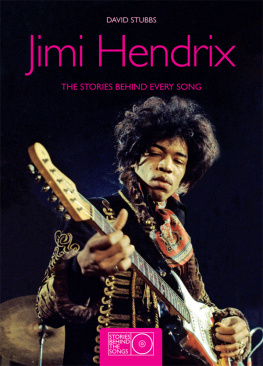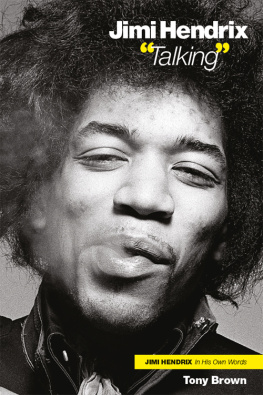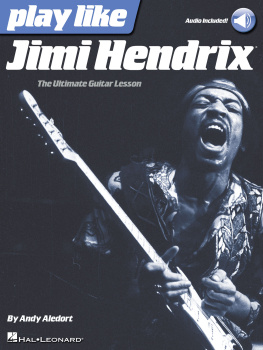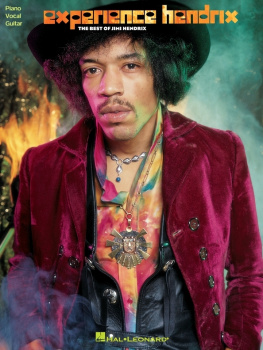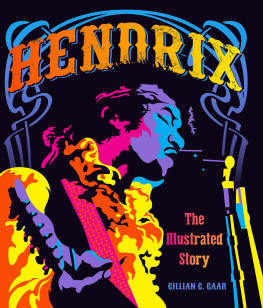
CONTENTS

T O ALL INTENTS AND PURPOSES THIS BOOK HAS BEEN WRITTEN BY JIMI HENDRIX. But since it has been compiled posthumously, it seems only fair to offer an explanation as to how the final text was arrived at.
In a way, even the idea for the book came from Jimi himself. It evolved out of a film biography of him I was working on with Alan Douglas. Not wishing to put words into Jimis mouth, we began experimenting with dialogue culled from records of things he had actually said. An enormous dossier was compiled from all sources that could be definitively authenticated. There was a superabundance of material, since during his four years in the spotlight, he was constantly giving interviews. He was also a compulsive writer, using hotel stationery, scraps of paper, cigarette cartons, napkins anything that came to hand.
Although extracts from some of these interviews and writings have been published before, they have all too often been commandeered to support other peoples ideas about his life and music. Yet on reading through all the available material, it is clear that Jimi left behind his own remarkable and comprehensive account of himself, albeit in a fragmented and somewhat elliptical manner. We felt it imperative that, amongst the plethora of myths and half-truths, Jimi should be allowed to offer his own personal version of his life and music.
Starting At Zero is the result of reorganizing this material into a narrative order. As a filmmaker, it seemed only natural to go about the task as if I were editing documentary film footage. The fact that Jimis speech patterns are so rhythmic and his turns of phrase so visually rich served to enhance this approach. In a remarkable and haunting way, the book took on a life of its own. It began to develop of its own free will, so much so that I began to wonder, if this is ghost writing, exactly which one of us is the ghost? In saying that, I suppose what Im really doing is paying tribute to the extraordinary power of Jimis presence through his words.
In fact, he told his story so well that I had to take very few liberties. Apart from eliminating repetitions, I have very occasionally combined sentences or changed grammar where it seemed necessary to clarify the meaning. Also, because the source material was not originally intended to be used in this way, I have added brief notes to give essential background information and assist the continuity of events. Lyrics are included not simply because they are referred to in the text, but also because the body of Jimis songs are in themselves autobiographical. He always claimed that for him, life and music were inseparable. In the absence of his music, which is the one true testimony, they constitute an essential poetic dimension.
Jimis memories of the first twenty-three years of his life fell easily into a narrative order. For obvious reasons he never gave a clear and consecutive account of the last four years. He did, however, speak at length of the ideas that were forming in his mind and of the changes of perception and consciousness he was experiencing. Accordingly, as the book progresses, it becomes less an account of external events and more an exploration of an internal journey. This internal journey is the crux of the book most appropriately, since the crossing of boundaries is at the heart of Jimis story.
Up to some point the working title for this book was Letter To A Room Full Of Mirrors. The mirror was an image Jimi became obsessed with during the last years of his life. It can be seen as a symbol or the threshold of the most important crossing of all. According to Native American traditions, the mirror of self-reflection represents our normal state of humanity, a state of self-imprisonment in which we view the world from a conditioned, repetitive and therefore non-creative standpoint. In these terms, to break the mirror of self-reflection means to reach beyond this limited world view to the infinite possibilities of the creative source itself.
Such a ones vision, ideas and inspirations come pristine from the primary springs of human life and thought. Hence they are eloquent, not of the present, disintegrating society and psyche, but of the unquenched source through which society is reborn. The hero has died as a modern man; but as eternal man perfected, unspecific, universal man he has been reborn. [J OSEPH C AMPBELL ]
If this book works at all, it is because Jimi was willing to speak about himself with such sensitivity, candor and humor. In this respect we must give special thanks to the many journalists who interviewed Jimi and to the collectors who recorded and preserved the material from which the book has been compiled. I would particularly like to thank Michael Fairchild for his tireless efforts in locating and authenticating the source material and also for his boundless enthusiasm and creative input; Christopher Mould for his invaluable support and participation during the difficult period of the genesis of the book; and Kevin Stein for his patience and sensitivity in helping me to finalize the last draft. Finally, I am eternally grateful to Alan Douglas for giving me the opportunity to work on such a deeply rewarding project. His knowledge and advice have throughout provided invaluable guidelines, and it is his foresight and dedication that have made it possible to produce this book.
P ETER N EAL




I was born in Seattle,
Washington,
USA,
on November 27th,
1942
at the age of
ZERO.
I REMEMBER A NURSE PUTTING A DIAPER ON ME and almost sticking me. I must have been in the hospital sick about something, because I remember I didnt feel so good. Then she took me out of this crib and held me up to the window, and she was showing me something up against the sky. It was fireworks so it must have been the Fourth of July. That nurse turned me on, being high on penicillin she probably gave me, and I was looking up and the sky was just
S s s c h u u s s s S c h u s h
Our first trip there!
I also remember when I was small enough to fit into a clothes basket. And I remember when I was only four and I wet my pants, and I stayed out in the rain for hours so I would get wet all over and my mom wouldnt know. She knew though.
Dad was very strict and levelheaded, but my mother used to like dressing up and having a good time. She used to drink a lot and didnt take care of herself, but she was a groovy mother. There were family troubles between my mother and father. They used to break up all the time, and my brother and I used to go to different homes. I stayed mostly at my aunts and grandmothers. I always had to be ready to go tippy-toeing off to Canada.
My grandmothers Indian. Shes part Cherokee. Theres a lot of people in Seattle that have Indian mixed in them. Its just another part of our family, thats all.
I used to spend a lot of time on her reservation in Vancouver, British Columbia. Theres a lot of them on the reservation, man, and it was really terrible. Every single house is the same, and its not even a house, its like a hut. Its just a really bad scene. Half of them are down on skid row, drinking and really completely out of their minds. And theyre not doing anything. I used to get so mad that I just just didnt pay too much attention when the teacher told us that Indians are bad! I mean, in other words, All Indians are bad because theyve got the clap!
Next page
